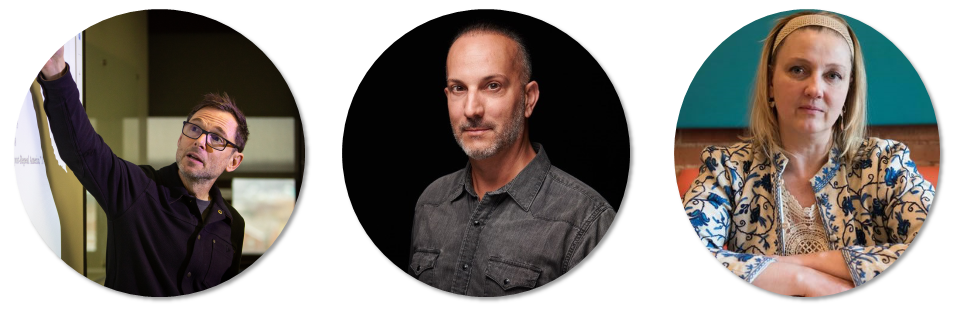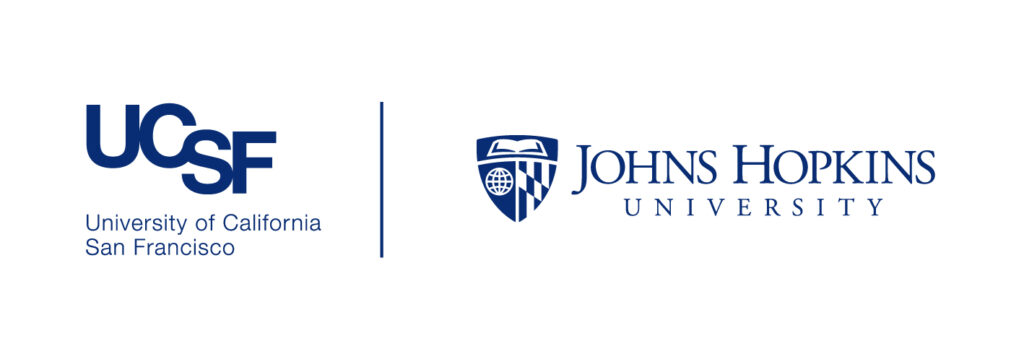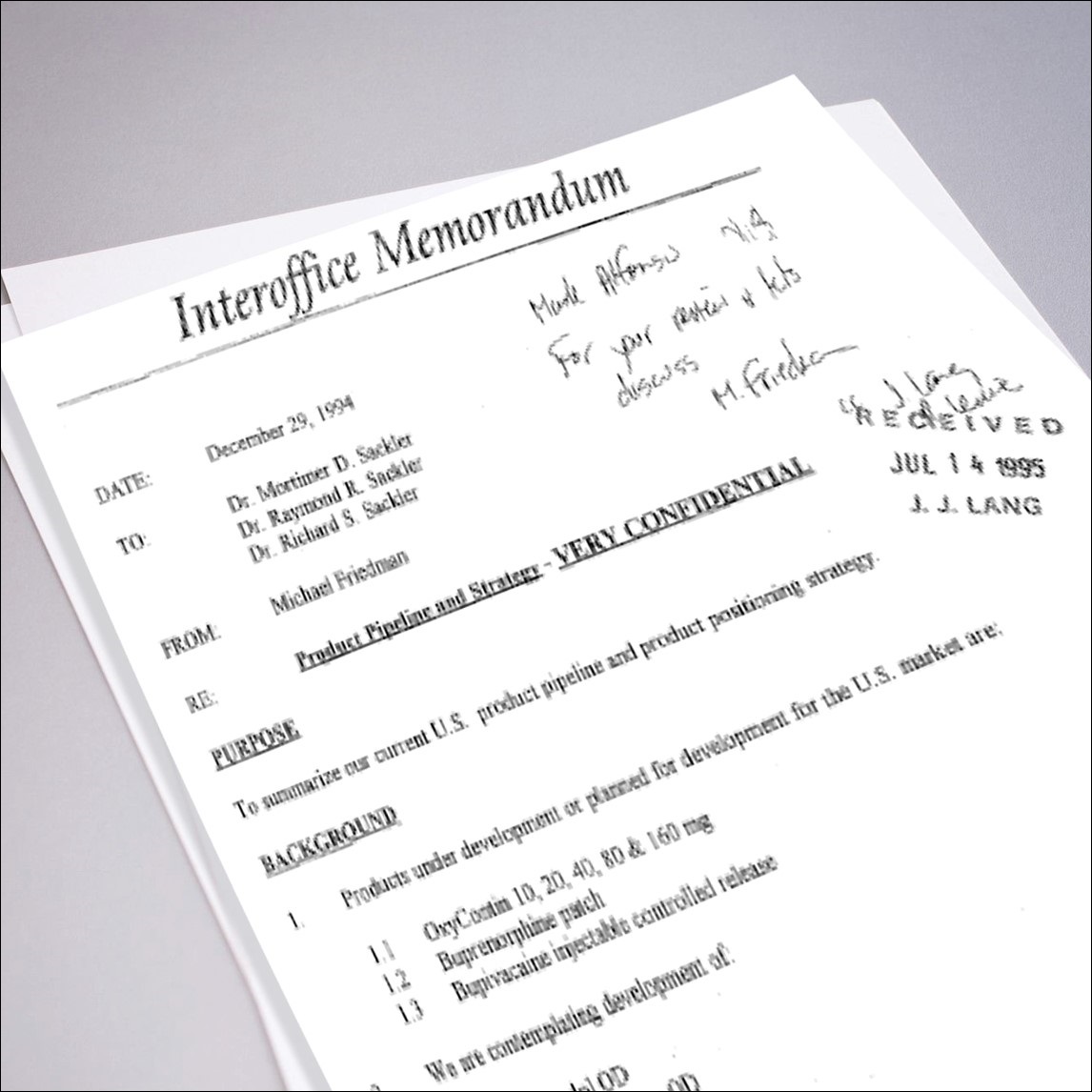The Opioid Industry Documents Archive (OIDA) is a digital archive co-created by the University of California, San Francisco and Johns Hopkins University containing millions of documents from the opioid industry that shed light on the root causes of the opioid crisis. This unique virtual symposium offers a series of complementary panels that demonstrates OIDA’s value in addressing fundamental questions of importance to historians, health policy and legal experts, journalists, archivists and people with lived experience.
Watch recordings of the full symposium. Recordings for individual presentations are linked below.
Day #1: Health Journalism, Law and Policy
Tuesday, May 6, Noon-2:30 PM (ET) ● 9:00 AM-11:30 AM (PT)
This group of experts will discuss the role of journalism and storytelling in the development of laws and policies designed to prevent further harms from the opioid crisis, and the critical role of document disclosure as a means to improve public health. Watch the full Day 1 recording.
12:00-12:15 Welcome (Caleb Alexander, Johns Hopkins University) [video]
G. Caleb Alexander is professor of epidemiology and medicine at the Johns Hopkins Bloomberg School of Public Health and co-founding director of its Center for Drug Safety and Effectiveness.
12:15-1:00 Keynote (Scott Higham, Investigative Reporter, Author of American Cartel) [video]
Scott Higham is a Pulitzer, Emmy and Peabody award-winning journalist and author, nationally known for his investigative work for The Washington Post and 60 Minutes and long-form nonfiction narrative storytelling. Higham was a lead reporter for the Washington Post team that developed “The Opioid Files,” a series that exposed the inner workings of the companies that fueled the crisis and is credited with forming the foundation for the largest civil action in American history. Included in this investigative series is reporting on OIDA’s Mallinckrodt documents when they were first released in 2022. OIDA includes documents that were unsealed thanks to a lawsuit filed by the Washington Post and HD Media. Higham and his Washington Post colleagues also worked with Academy Award-winning director Alex Gibney to produce Crime of the Century (2021), a two-part HBO investigation into the forces that fueled the epidemic.
Higham later collaborated with Lenny Bernstein at the Washington Post and Bill Whitaker and producers Ira Rosen and Sam Hornblower at 60 Minutes for additional investigations into the opioid industry. More recently, he worked with Whitaker and producers Graham Messick and Jack Weingart on an investigation into the Mexican drug cartels and the scourge of fentanyl in the U.S.
Higham and Washington Post colleague Sari Horwitz co-authored the critically acclaimed book, American Cartel: Inside the Battle to Bring Down the Opioid Industry (2022) and Finding Chandra: A True Washington Murder Mystery. (2010). In addition to covering the opioid crisis, Higham’s award-winning news investigations have ranged in subject from the D.C. foster care system, abuses at the Abu Ghraib prison in Iraq, waste and fraud in Homeland Security contracting, and much more.
1:00-1:30 Presentation #1 (Rahul Gupta, GATC Health) [video]
Rahul Gupta, MD, MPH, MBA, is president of GATC Health, a technology company accelerating the future of precision medicine and leveraging artificial intelligence to transform drug discovery. From 2021-2025, he was the first physician to serve as Director of the White House Office of National Drug Control Policy (ONDCP), after being confirmed by the United States Senate. Reporting to the President of the United States, Dr. Gupta oversaw a $44 billion drug budget across 19 federal agencies. Under his leadership, the nation experienced historic declines in overdose deaths.
A board-certified internist, Dr. Gupta has been a practicing primary care physician for more than 25 years. He has served as a local public health official and as the West Virginia Health Commissioner under two Governors. As the state’s Chief Health Officer, his leadership of opioid crisis response included expanding access to naloxone, harm reduction services, and treatment services.
His lifelong commitment to educating the next generation of physicians and policymakers has led him to hold academic appointments throughout his career including as a clinical professor in the Department of Medicine at Georgetown University School of Medicine and as visiting faculty at the Harvard University T.H. Chan School of Public Health. Additionally, his passion for global health led him to join the March of Dimes as Chief Medical and Health Officer and Senior Vice President, where he provided strategic oversight for the organization’s domestic and global medical and public health efforts.
Dr. Gupta has been recognized for his career of public service by the American Medical Association, the American Public Health Association, and by Governing Magazine, which named him their Public Health Official of the Year in 2018.
1:30-2:00 Presentation #2 (Ashton Marra, West Virginia University) [video]
Ashton Marra is a Teaching Associate Professor at West Virginia University, where she teaches news writing, video storytelling and community-focused journalism.
Marra is the co-founder and co-director of Reporting on Addiction, a collaboration of addiction science experts, professional journalists and journalism educators who share a passion to decrease stigma and improve the way journalists cover addiction and recovery. Reporting on Addiction trains professional and student newsrooms and addiction science experts, creates research-based reporting resources, and has built a network of journalism professionals nationwide who are committed to improving reporting in this space.
Marra has worked in both public and commercial media newsrooms in New York City, Ohio and West Virginia, and her reporting has appeared nationally on NPR and PBS, as well as “Good Morning America,” where she worked with correspondents across the country to produce video news stories in the field and in the studio. She served as the assistant news director for the statewide public television and radio network West Virginia Public Broadcasting and as its lead political reporter, hosting and producing the network’s flagship television program “The Legislature Today.” While working in public media, Ashton was also the producer and host of several radio programs as well as original podcasts. She was twice named the Associated Press of the Virginias Best Reporter.
2:00-2:25 Facilitated Discussion (Corey Davis, Network for Public Health Law) [video]
Corey Davis, J.D., M.S.P.H., serves as Director of the Network for Public Health Law’s Harm Reduction Legal Project. Davis was previously a Senior Attorney at the National Health Law Program (NHeLP), where he helped to advance access to quality health care for low-income and underserved individuals. Before joining NHeLP Davis served as Employment Rights Attorney at Equality Advocates Pennsylvania, where he represented lesbian, gay, bisexual and transgender (LGBT) individuals before administrative commissions and in state and federal courts. He previously oversaw a street-based legal clinic sited at Philadelphia’s syringe services program.
Davis has served as chair of a county board of health, chair of the board of the North Carolina Harm Reduction Coalition, and vice-chair of the North Carolina Public Health Foundation, among other positions. He is an adjunct assistant professor at the NYU Grossman School of Medicine and has published extensively in the lay and academic press.
2:25-2:30 Wrap-up (Caleb Alexander)

From left to right: Scott Higham, Rahul Gupta, Ashton Marra, Corey Davis
Day #2: Information Science
Wednesday, May 7, Noon-2:30 PM (ET) ● 9:00 AM-11:30 AM (PT)
In the digital age, organizational records are being produced on a scale that dwarfs earlier archives of institutional records. Speakers will talk about the challenges and opportunities of managing and providing access to massive digital collections like OIDA. Watch the full Day 2 recording.
12:00-12:15 Welcome (Polina Ilieva, University of California, San Francisco) [video]
Polina Ilieva is the associate university librarian for collections and university archivist at the University of California, San Francisco (UCSF).
12:15-1:00 Keynote (Elizabeth Yakel, University of Michigan) [video]
Elizabeth Yakel, PhD, is the C. Olivia Frost Collegiate Professor of Information at the University of Michigan School of Information, as well as Faculty Associate, Inter-university Consortium for Political and Social Research, Institute for Social Research at the University of Michigan. Previously, she served as Interim Dean of the School of Information and Senior Associate Dean for Academic Affairs. Her research interests include digital archives and curation, specifically data reuse; teaching with primary sources; and the development of standardized metrics to enhance repository processes and the user experience.
Professor Yakel has been a PI or co-PI on numerous grants from the Institute for Museum and Library Services (IMLS), the National Science Foundation (NSF), the National Park Service (NPS), and the Mellon Foundation. Her current research examines data sharing and reuse of public health data during the COVID-19 pandemic.
1:00-1:30 Presentation #1 (Daniel van Strien, Hugging Face) [video]
Daniel van Strien is the Machine Learning Librarian at Hugging Face, a startup focused on democratizing good machine learning. Van Strien’s work at Hugging Face is focused on developing a healthier machine learning ecosystem with a particular focus on data and metadata. Previously, van Strien worked at the British Library on “Living with Machines”, the UK’s largest-ever Digital Humanities project, which aimed to use machine learning and data science to understand digitized collections from the British Library and other institutions “at scale”. Van Strien led BigLAM, an effort focused on increasing the availability of datasets from libraries, archives and museums for training and evaluating machine learning models, as part of the BigScience project, a one-year research workshop focused on responsibly developing a multilingual Large Language Model, leading to the BLOOM model.
Van Strien’s career has focused on how new computational methods can be effectively used within libraries and archives; a significant part of this work has involved developing tutorials and other teaching materials to make machine learning more accessible to librarians, archivists and humanities researchers. Van Strien currently serves on the AI4LAM advisory council and has previously co-chaired the Machines Reading Maps advisory board and the Computer Vision for Digital Heritage Special Interest Group at the Alan Turing Institute.
1:30-2:00 Presentation #2 (Jill Reilly, National Archives and Records Administration) [video]
Jill Reilly is the Acting Chief Innovation Officer at the National Archives and Records Administration (NARA) and the Digital Engagement Director. She leads the National Archives Catalog technical, description, and metadata standards and authorities programs, in addition to artificial intelligence pilots related to description, search and information retrieval, and transcription. She has a master of library science degree in archival administration and a master of arts in U.S. history from the University of Maryland in College Park.
2:00-2:25 Facilitated Discussion (Kevin Hawkins, Johns Hopkins University) [video]
Kevin Hawkins is Program Director for the Opioid Industry Documents Archive at the Johns Hopkins Bloomberg School of Public Health.
2:25-2:30 Wrap-up (Polina Ilieva)

From left to right: Elizabeth Yakel, Daniel van Strien, Jill Reilly
Day #3: Histories and Stories of the Opioid Crisis
Thursday, May 8, Noon-2:30 PM (ET) ● 9:00 AM-11:30 AM (PT)
This interdisciplinary panel will explore the ways in which OIDA collections serve as an important resource for looking back and looking forward, telling new stories and developing new analyses about the worst drug epidemic in U.S. history. Watch the full Day 3 recording.
12:00-12:15 Welcome (Kelly Knight, University of California, San Francisco) [video]
Kelly Knight is professor of humanities and social sciences in the School of Medicine at the University of California, San Francisco.
12:15-1:00 Keynote (David Herzberg, University at Buffalo (SUNY)) [video]
David Herzberg is a Professor of History at the University at Buffalo (SUNY) whose research explores the nature and trajectory of drug commerce, drug use, and drug policy in America, with a primary focus on psychoactive pharmaceuticals. His work has appeared in numerous scholarly and medical journals, in popular media, and in three books: White Market Drugs: Big Pharma and the Hidden History of Addiction in America (University of Chicago Press, 2020), Whiteout: How Racial Capitalism Changed the Color of Opioids in America (University of California Press, 2023), and Happy Pills in America: From Miltown to Prozac (Johns Hopkins University Press, 2009). He is also co-editor of Social History of Alcohol and Drugs: An Interdisciplinary Journal, the peer-reviewed journal of the Alcohol and Drug History Society.
1:00-1:30 Presentation #1 (Domenic Esposito, Opioid Spoon Project) [video]
Domenic Esposito is an artist and social activist who has achieved international attention through his sculptural execution of a massive opioid spoon placed on the doorsteps of major pharmaceutical giants. The Opioid Spoon is a symbolic eight hundred pound, ten-foot metal replication of a simple household utensil modified to cook and inject opioids. The Spoon is crafted in honor of his own family’s struggles and those of thousands of families who have lost loved ones to the opioid epidemic.
Esposito went on to establish the Opioid Spoon Project, a nonprofit that continues to serve as a solution-based platform for those affected by the opioid crisis. He has worked alongside Nan Goldin and other artists organizing protests and marches regarding the opioid crisis. His artwork has been featured in the New York Times, The Art Newspaper, Hyperallergic, Le Monde, Frieze Magazine, Artnet news, Vice, ARTnews, and many other publications around the globe.
Domenic’s work has been exhibited in a range of galleries and art fairs across the U.S., including Beacon Gallery, Boston; Piano Craft Gallery, Boston; Westbeth Gallery, New York; and Insight Artspace, New York. Placement of the spoon includes Art Basel Miami, Chicago Art Fair, among others.
1:30-2:00 Presentation #2 (Alexis Pleus, Truth Pharm) [video]
Alexis Pleus is the founder and executive director of Truth Pharm, a nonprofit organization with a focus on raising awareness, reducing the stigma, educating and advocating to reduce the harms caused by substance use.
Pleus is a licensed professional engineer with over 25 years of experience in the design and construction industry, has been a corporate trainer for over 20 years, and was an adjunct professor for 9 years in the Civil Engineering program at SUNY Broome. In 2014, she lost her oldest son, Jeff, to a heroin overdose. In response, Pleus founded Truth Pharm, an organization that is deeply committed to harm reduction, social and racial justice issues as we move forward in addressing the current overdose epidemic.
Pleus serves on a statewide coalition to End Overdose in NY and she’s the Co-chair for the New York State Harm Reduction Association. She serves on the National Coalition for Harm Reduction Funding and the Opioid Network. She has spoken at Congressional hearings, the International Harm Reduction Conference, as well as other events.
2:00-2:25 Facilitated Discussion (Dan Kabella, University of California, San Francisco) [video]
Dan Kabella is an Opioid Industry Documents Archive (OIDA) postdoctoral fellow at the University of California, San Francisco.
2:25-2:30 Wrap-up

From left to right: David Herzberg, Domenic Esposito, Alexis Pleus
The OIDA National Symposium has been made possible in part with support from the UCSF-JHU Opioid Industry Documents Archive.



